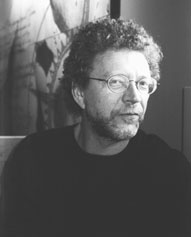 |
|
||
|
|||
Noted critic Birkerts becomes editor of Agni on its 30th anniversary
By David J. Craig
Growing up in Detroit in the 1960s, Sven Birkerts was painfully self-conscious about the ill fit of his affluent Latvian family with the blue-collar manufacturing city. Birkerts sought refuge, both from his surroundings and from his type-A father, in literature: first, by reading books voraciously, and later as a young man, by attempting to pen his own, in the vein of Ernest Hemingway. It was not until he was in his late 20s and working at Boston’s Brattle Book Store, however, that he found his true calling: writing about books.
 |
|
| As the new editor of the literary journal Agni, Sven Birkerts says he will solicit experimental fiction and poetry by writers who “give language a workout,” as well as nonfiction. Photo courtesy of Sven Birkerts | |
“I struggled for years trying to duplicate the experience I got
reading novels by creating them myself, but it was bloody hard,”
says Birkerts. “It was absolute toil. Yet I found, to my enormous
surprise, that when I turned my attention to writing criticism, it came
out almost effortlessly. There was this second voice inside me, which
is this impartial and slightly detached critic.”
Today, Birkerts uses that voice to lead the prestigious literary journal
Agni, published at BU since 1987. Askold Melnyczuk (GRS’78), the
journal’s founding editor, stepped down from the position this past
July to become director of the creative writing program at UMass-Boston.
Birkerts, a longtime contributing editor, will ceremoniously take over
as editor at Agni’s 30th anniversary celebration, on Wednesday,
October 30, at 8 p.m., in Room 107 of the Metcalf Center for Science and
Engineering, at 590 Commonwealth Ave. Reading at the event will be 14
prominent local poets, including Nobel Laureate Seamus Heaney, former
U.S. Poet Laureate and CAS English Professor Robert Pinsky, William Corbett,
Diana Der-Hovanessian (CAS), Stuart Dischell, Sharon Dunn, Michael Franco,
Fred Marchant, Gail Mazur, Dzvinia Orlowsky, David Rivard, Lloyd Schwartz,
and Tom Sleigh.
Available at the celebration will be Agni 56, a 480-page anthology of
the best poetry published in Agni since its 1972 inception. The last issue
edited by Melnyczuk, who started the journal as a New Jersey high school
student, Agni 56 will include one poem by each of 243 poets, including
CAS Creative Writing Professor and Nobel Laureate Derek Walcott, Heaney,
Joseph Brodsky, Adrienne Rich, and Rita Dove.
Birkerts, a renowned critic and essayist who won the 1995 National Book
Circle Citation for Excellence in Reviewing, has contributed to the New
York Times Book Review, The New Republic, and The Nation. He is the author
of six books, including The Gutenberg Elegies: The Fate of Reading in
an Electronic Age (Fawcett, 1995) and a new memoir, My Sky Blue Trades:
Growing Up Counter in a Contrary Time (Viking Press, 2002).
He took the Agni job, he says, out of dedication to “promoting the
cause” of serious literature. “The way people occupy their
time is so accelerated and diffuse these days,” he says, “I
think the old idea of a literary culture is endangered.”
A champion of experimental modernist authors, Birkerts wants Agni to showcase
work that “really gives language a workout” and offers a strictly
contemporary aesthetic. “As much as I like the standard, straight-up
realist story, it’s not what I’m shopping for,” he says.
“I’m interested in writing that reflects what, for me, is
the extremely elusive sensibility we have of living in a very strange
world -- a world gone half electronic, gone global, a world with a lot
of dissonant energies. I think really good writing needs to capture and
reflect that, and it’s hard to accomplish in a really traditional
mode.”
Under his direction, the journal will include more nonfiction than it
has in the past. Birkerts also plans to use his literary connections to
solicit contributions from established artists and raise the magazine’s
visibility.
“Agni is a very small circulation journal, and there’s lot
of work to be done to get it out to the public so it’s competing
with a magazine like Ploughshares,” he says. “I’m doing
a lot in terms of contacting people I know and respect and trying to induce
them to do labors of love for me, because we just don’t have the
checkbook. If you can’t write the check, you’re basically
trying to bribe someone to be a part of your artistic vision.”
One thing about Agni that will not change, says Birkerts, who also teaches
writing at Mount Holyoke and Bennington colleges, is its dual emphasis
on local and international literature. “Agni is simultaneously homegrown,
with roots running deep in the Boston literary community,” he says,
“and yet it is also extremely responsive to the idea that literature
is a global phenomenon.
“Askold and I have an old, solid friendship and we share a lot in
terms of our sensibilities, so you’re not going to open up the first
issue of Agni that I edit and see a completely different product,”
Birkerts says. “It’s just going to be changes of emphasis,
and that will happen gradually over time. If we succeed, I hope we’ll
see more independent submissions from established writers who see the
magazine and think, ‘Hey, I want to be a part of this.’”
Tickets to Agni’s 30th anniversary celebration on October 30 are $15; $5 with a student ID. To learn more about the event, or about a special fundraising cocktail party prior to the reading, contact Eric Gunwald at 353-7135.
![]()
25 October 2002
Boston University
Office of University Relations